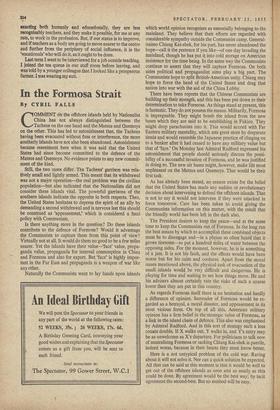In the Formosa Strait
By CYRIL FALLS COMMENT on the offshore islands held by Nationalist China has not always distinguished between the Tachens on the one hand and the Matsus and Quemoys on the other. This has led to astonishment that, the Tachens having been evacuated without fuss or interference, the more southerly islands have not also been abandoned. Astonishment became resentment here when it was said that the United States had since become committed to the defence of the Matsus and Quemoys. No evidence points to any new commit- ment of the kind.
Still, the two cases differ. The Tachens' garrison was rela- tively small and lightly armed. This meant that its withdrawal was not a major operation—the real problem was the civilian population—but also indicated that the Nationalists did not consider these islands vital. The powerful garrisons of the southern islands indicate the opposite in both respects. Then, the United States hesitates to depress the spirit of an ally by demanding a second withdrawal and is nervous lest this should be construed as 'appeasement,' which is considered a fatal policy with Communism.
Is there anything more in the question? Do these islands contribute to the defence of Formosa? Would it advantage the Communists to capture them from this point of view? Virtually not at all. It would do them no good to be a few miles nearer. Yet the islands have their value—'face' value, propa- ganda value, propaganda for internal consumption in China and Formosa and also for export. But 'face' is highly impor- tant in the Far East and propaganda is a weapon of war like any other.
Naturally the Communists want to lay hands upon islands which world opinion recognises as essentially belonging to the mainland. They believe that their efforts are regarded with considerable sympathy outside the Communist camp. General- issimo Chiang Kai-shek, for his part, has never abandoned the hope—call it the pretence if you like—of one day invading the mainland, though he has put it into cold storage on American insistence for the time being. In the same way the Communists continue to assert that they will capture Formosa. On both sides political and propagandist aims play a big part. The Communists hope to split British-American unity. Chiang may hope to force the hand of the United States and drag that nation into war with the aid of the China Lobby.
There have been reports that the Chinese Communists are building up their strength, and this has been put down to their determination to take Formosa. As things stand at present, this is fantastic. They do not possess the means. Militarily, Formosa is impregnable. They might bomb the island from the new bases which they are said to be establishing in Fukien. They might drop parachutists into it. This would accord with Far Eastern military mentality, which sets great store by desperate deeds and would resemble the Japanese practice of clinging on to a bunker after it had ceased to have any military value but that of 'face.' On Monday last Admiral Radford expressed his astonishment that people should seriously discuss the possi- bility of a successful invasion of Formosa, and he was justified in doing so. The new air bases might, however, make life most unpleasant on the Matsus and Quemoys. That would be their first task.
As has already been stated, no reason exists for the belief that the United States 'has made any sudden or revolutionary decision about intervening to defend the offshore islands. That is not to say it would not intervene if they were attacked in force tomorrow. Care has been taken to avoid giving the Communists information on this matter, with the result that the friendly world has been left in the dark also.
The President desires to keep the peace—and at the same time to keep the Communists out of Formosa. In the long run the best means by which to accomplish these combined objects must be to disengage and—in a phrase so often heard that it grows tiresome—to put a hundred miles of water between the opposing sides. For the moment, however, he is in something of a jam. It is not his fault, and the effects would have been worse but for his calm and coolness. Apart from the moral issues mentioned above, the physical task of evacuation of the small islands would be very difficult and dangerous. He is playing for time and waiting to see how things move. He and his advisers almost certainly rate the risks of such a course lower than they are put in this country.
As regards Formosa itself there is no hesitation and hardly a difference of opinion. Surrender of Formosa would be re- garded as a betrayal, a moral disaster, and appeasement in its most vicious form. On top of all this, American military opinion has a firm belief in the 'strategic value of Formosa, as a link in the island chain of defence. This also was emphasised by Admiral Radford. And in this sort of strategy such a loss counts double. If X walks out, Y walks in, and Y's entry may be as unwelcome as X's departure. For politicians to talk now of neutralising Formosa or sacking Chiang Kai-shek is puerile, indeed worse, because in their hearts they must know better.
Here is a not untypical problem of the cold war. Raving about it will not solve it. Nor can a quick solution be expected. All that can be said at this moment is that it would be well to get out of the offshore islands as soon and as neatly as this could be done. By agreement would be the best way; by tacit agreement the second-best. But no method will be easy.










































 Previous page
Previous page